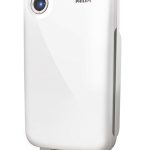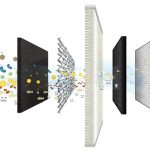There are a number of kinds of air pollutants and different forms of purifiers to deal with them. In this post we are only dealing with purification that solves the particulate matter pollution currently affecting Delhi.
- A typical air purifier
- The filters inside an air purifier
How a typical air purifier is made
An air purifier consists of a series of filters, through which air is pushed. The filters are designed to catch dust, particulate matter, noxious gases and germs. Some filters can be cleaned, most others will need to be replaced periodically.
Filtration
Particulate Matter are small airborne particles. These can be mechanically filtered out of the air. Air is forced through a filter, which physically captures the particles. The most common form of such filters is the HEPA filter, and is almost universally used in domestic air purifiers. A HEPA filter removes at most 99.97% of 0.3-micrometer particles, and is usually more effective for particles which are larger.
A HEPA filter is composed of a mat of randomly arranged fibers. It does not behave like a typical sieve. Broadly speaking, capturing of larger particles works better at high air speeds. Capturing of smaller particles requires lower air speeds. This explains why the Philips AC4014/10 and Moonbow AP-A8400UIN could not clean beyond the 200 µg/m3 PM2.5 point when running on high.
HEPA filters are not washable and need to be replaced periodically. These are consumables in an air purifier.
Prefilter
Most good air purifiers have a washable prefilter. This captures coarse dust particles, as are commonly found in Indian households. A prefilter is a cost effective way of extending the life of consumable filters in your air purifier.
Carbon Filter
An active charcoal or activated carbon filter captures particles at the microscopic level. It is usually deployed after the HEPA filter, and reduces PM2.5 and PM10 levels. It also captures noxious gases such as NO2 and hydrocarbons, making the air smell better and reducing nausea typically induced by polluted air1.
Air Ioniser
Note: An air purifier that only works by ionising air will not work for you in Delhi.
Air ionisation can help reduce air pollution. They are also supposed to kill bacteria. The science behind this is dubious2, in my opinion.
UV Filter
Kills microbes in the air. In Delhi we are fighting suspended particulate matter, not germs. Therefore this is optional if your only concern is pollution.



Recent Comments